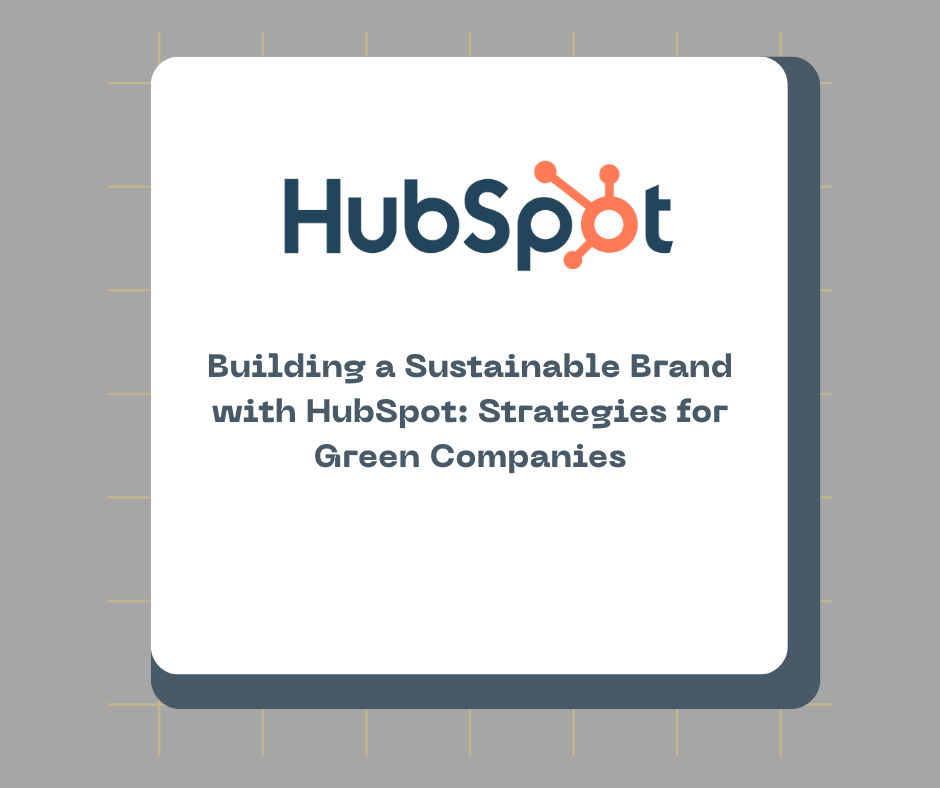In an era where environmental concerns are at the forefront of consumer minds, building a sustainable brand is not just an ethical choice but a strategic business move. For companies committed to sustainability, communicating their eco-friendly practices effectively can help attract a loyal customer base and differentiate their brand in a competitive market. HubSpot, with its comprehensive suite of tools, offers powerful capabilities for green companies looking to enhance their brand’s sustainability and engage with like-minded consumers. This article explores how green companies can use HubSpot to build a sustainable brand and strengthen their market presence.
The Importance of Sustainability in Branding
Today’s consumers are more environmentally conscious than ever before. Many prefer to purchase from brands that demonstrate a commitment to sustainability, affecting their purchasing decisions across various sectors, from retail to services. Therefore, for companies that prioritize green practices, showcasing this commitment through every aspect of their business operations and marketing strategy is crucial.
Challenges Faced by Sustainable Brands
- Authenticity in Messaging: Consumers are becoming increasingly skeptical of greenwashing—companies falsely claiming eco-friendliness. Authentic communication is essential.
- Engaging Eco-conscious Consumers: Effectively reaching and engaging a demographic that is deeply informed and passionate about sustainability.
- Measuring Impact: Quantifying and communicating the impact of sustainability initiatives in a clear and transparent manner.
- Integration Across Channels: Maintaining a consistent sustainable message across various marketing channels.
Leveraging HubSpot for Sustainable Branding
HubSpot provides a robust platform to tackle these challenges head-on, enhancing marketing efforts, and building stronger customer relationships through targeted, efficient, and authentic communication strategies.
1. Streamlining Communications with HubSpot’s CRM
HubSpot’s CRM is an excellent tool for managing customer relationships and ensuring that all communications are aligned with the brand’s sustainable values.
- Strategy Example: Utilize the CRM to segment your audience based on their interests in specific sustainability issues, such as zero waste, renewable energy, or ethical sourcing. Tailor communications to these segments to ensure relevance and deepen engagement.
2. Content Marketing that Educates and Engages
Content marketing is crucial for sustainable brands to educate their audience about environmental issues and the company’s efforts to address them. HubSpot’s CMS can be used to create and manage impactful content.
- Strategy Example: Develop a blog series or video content that highlights behind-the-scenes efforts towards sustainability, such as the use of renewable materials, partnerships with green initiatives, or community engagements. Use HubSpot to schedule and publish this content, track engagement, and optimize based on performance data.
3. Personalizing Consumer Interactions
Personalization can significantly enhance customer engagement and loyalty, especially when aligned with the values shared by the company and its customers.
- Strategy Example: Deploy personalized email marketing campaigns with HubSpot that share updates on the company’s sustainability milestones or offer opportunities for customers to participate in eco-friendly initiatives. Utilize HubSpot’s workflows to automate these communications based on user behavior and preferences.
4. Utilizing Social Media to Amplify Sustainable Practices
Social media is a powerful tool for sustainable brands to reach a broader audience and engage in real-time with eco-conscious consumers.
- Strategy Example: Use HubSpot’s social media tools to manage and monitor your social campaigns. Share regular updates about your sustainability efforts, promote eco-friendly products, and participate in broader environmental discussions. Engage directly with followers to build a community around shared sustainable values.
5. Leveraging Analytics for Impact Measurement
Measuring the impact of sustainability initiatives and marketing campaigns is essential for continuous improvement and transparent reporting.
- Strategy Example: Set up HubSpot’s analytics tools to track the performance of sustainability-focused content and campaigns. Monitor metrics such as engagement rates, conversion rates, and feedback to assess consumer response and refine strategies accordingly.
6. Enhancing Visibility with SEO and Online Presence
For green companies, being visible to the right audience online is crucial. HubSpot’s SEO tools can help optimize your online content, making it easier for eco-conscious consumers to find your brand.
- Strategy Example: Use HubSpot to research and integrate keywords related to sustainability and your specific green practices into your website and blog content. Ensure that all your content is optimized for search engines, enhancing visibility and attracting traffic from interested consumers.
Best Practices for Sustainable Branding with HubSpot
- Consistency is Key: Ensure that all messaging across various channels consistently reflects your commitment to sustainability. HubSpot’s tools can help manage this consistency effectively.
- Engage, Don’t Preach: Use your platforms to engage in discussions about sustainability rather than just preaching about its benefits. This creates a more inclusive atmosphere and encourages consumer participation.
- Show Real Impact: Use data and real-world examples to showcase the impact of your sustainability efforts. Authenticity in these communications builds trust and strengthens your brand’s credibility.
- Feedback Loop: Regularly solicit feedback from your audience on your environmental initiatives. Use HubSpot to manage this feedback and incorporate it into your ongoing sustainability strategies.
Conclusion
HubSpot offers numerous tools and functionalities that can significantly enhance the marketing efforts of sustainable brands. By effectively utilizing these tools, green companies can ensure that their message resonates with eco-conscious consumers, building a brand that is not only recognized for its products but also revered for its commitment to sustainability. In the modern market, where consumers increasingly make decisions based on corporate ethics and sustainability, HubSpot can be a pivotal asset in crafting a brand that stands for more than just profit.
Schedule your training session here and comment “Need Training” on the request form.

Comments